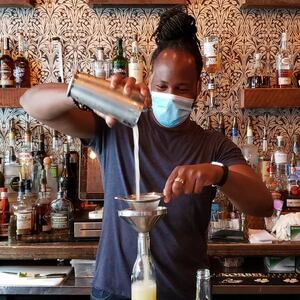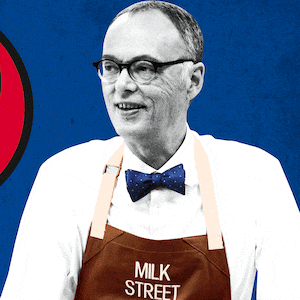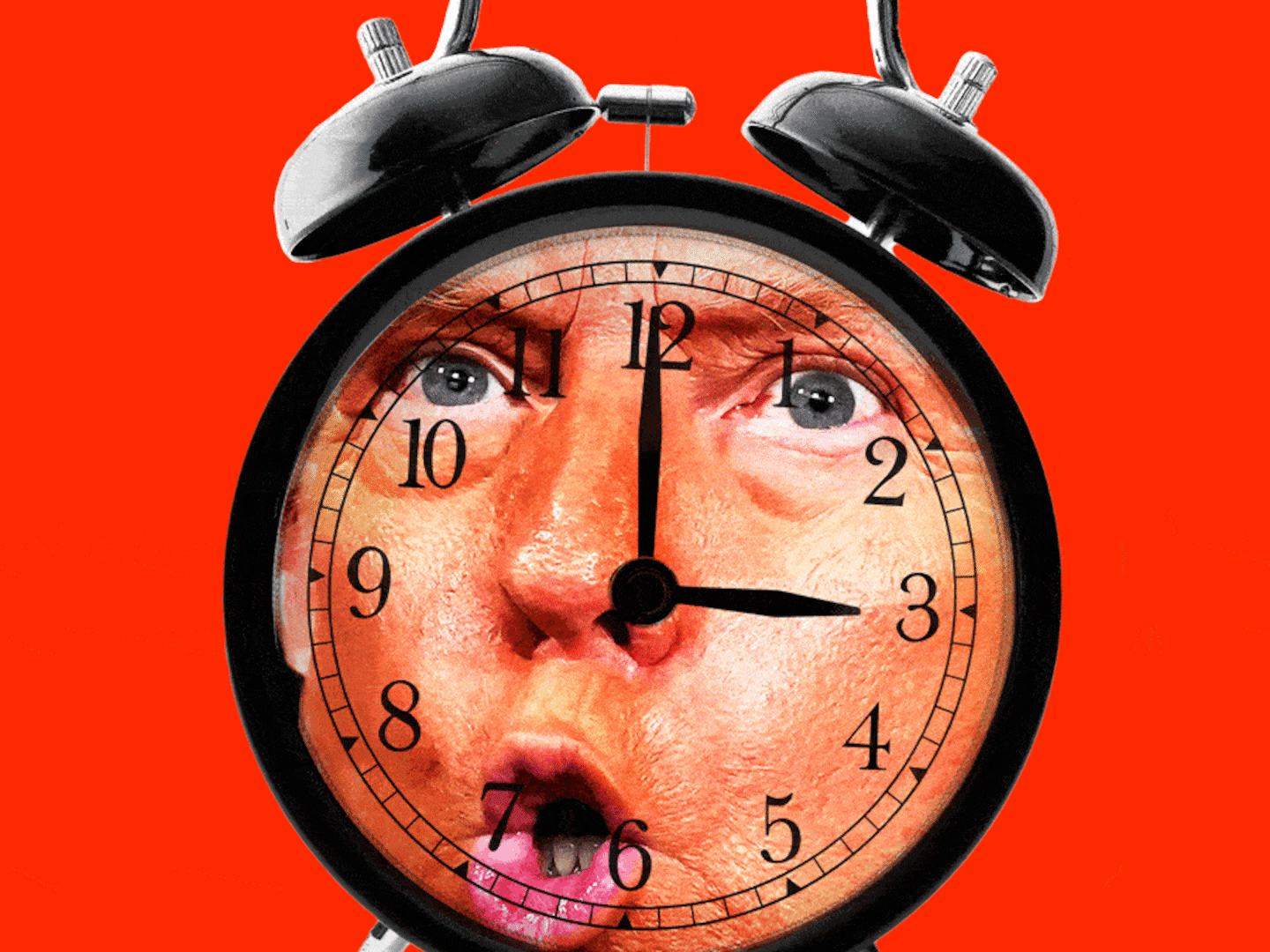After working in bars and restaurants for most of my life, I moved to Miami in 2018 to open Jaguar Sun, a tiny restaurant and cocktail bar in the lobby of a new apartment building downtown.
I had met my business partner, chef Carey Hynes, while running a well-regarded venue in Boston. His girlfriend, now wife, was working in Cambridge, while he was cooking in New York, and the bar I worked at was near the bus station. We stayed in touch and when the opportunity came around to open something, we decided to go for it. Miami felt like the right city because it was the only place in the country I had been that didn’t feel overrun with fussy new cocktail bars.
At the beginning of the pandemic, our place Jaguar Sun had been open for about two years. We had started with just three employees, hoping that patiently waiting for like-minded staff to show up would pay off better than a Craigslist hiring fair. Not the easiest approach, but probably correct when you’re a small lobby restaurant in a market where the owners don’t know anyone and it allowed us to slowly grow our team with the right hires.
Just as the bar was finally at a point where the idea of not being there every minute of everyday felt like a reasonable possibility, it became clear that the coronavirus was in the U.S. and more serious than anyone in a position of power was admitting.
We closed in February, 2020, almost exactly 24 hours before the city shut everything down. We had tried a single service running at a socially distant half capacity, which worked well until anyone had a sip of alcohol and then they ran straight to the bar, dashing our hopes of ever doing business that way.
The first weeks should have been the scariest, but for some reason they weren’t. Those early days were full of a quiet optimism, when we were telling the staff that things would blow over enough that we started to half believe it. We knew we could pay everyone for three or four weeks before needing some form of income, which seemed like enough time for things to go back to normal. Massive spoiler alert: it was not.
Like everyone else, we tried offering takeout for a while. Because our bar is small, and because we opened without investors, we were free to adjust and adapt as much as we wanted. This did us no good. No matter how many versions of to-go cocktails or pasta kits or cold food or hot food or delivery (try delivering three dozen shucked oysters on a bicycle some time, or on second thought don’t) nothing came close to a survivable revenue stream. It was evident early on that what made our restaurant special was the experience, and that was hard to package up in a to-go box.
Eventually, we teamed up with an organization that paid us a little bit to do meals for frontline workers. We started making and delivering 500 meals at a time, three days a week, in a kitchen that had originally been designed as a liquor closet. While I don’t think I’ll ever need to smell chicken frying again, it was a godsend, and enough to keep us emotionally and financially sound for another month or two. Unfortunately, the organization’s funds eventually ran out, and we were back to being a business with no business.
Staying open to keep the staff employed had become our clear and obvious objective. Florida’s unemployment system was quite literally built to keep people from enrolling and offered next to nothing even if you did somehow manage to sign up. Between the total lack of a safety net, and how hard it had been to build our team, there was no world in which we were willing to cut our staff loose.
Both my business partner and I are problematically stubborn. It is not fun to drink with us unless your idea of a good time is arguing about nothing for hours over small glasses of what most people would describe as very nasty rum. Usually this is just a shared personality deficit, but in this case, I believe pretty firmly that our stubbornness is what kept us going. Between our bad personalities, the fear of sending our staff out into the wilderness and the slow but very steady decline in our bank accounts, we eventually realized that we were going to have to come up with a Big Stupid Pivot.
There was a lot of time to look at Instagram last summer, specifically the Instagram accounts of other bars and restaurants. Everyone seemed to be trying essentially the same things, including cocktail kits and building ramshackle outdoor shelters. Across the country, it felt like people were simply subtracting ambiance and vibe from the equation of what made a restaurant successful, keeping everything else the same, and hoping that it would work out. Thankfully, in many cases, it did, but we were too small, in too weird of a location, and too cynical about what drives business in our market to have the confidence to bank on being able to do the same.
So we found a massive outdoor event space that was (obviously) unused and asked the landlord if we could try and throw a couple of dinners there. The space had effectively no restaurant infrastructure, but it does feature a stunning banyan tree, a couple restrooms and a selection of miscellaneous picnic tables and chairs from parties that had been thrown in prior years. It was enough for us to open, and we started hosting a taco night almost immediately. Logistics and workload were a nightmare, but the response was surprisingly strong, and the lesson was clear. People didn’t just want restaurant stuff, they wanted to feel like they were in a restaurant. Over the next few weeks, we realized that tacos were not our long-term solution; everyone had been cramped in their homes for months, and they wanted to go out on the town.

We settled on the classic American steakhouse as the next iteration of what was meant to be a dinner series. Our optimistically named restaurant Sunny’s was channeling LA’s legendary Musso & Frank or New York’s historic Keen’s, just in an essentially empty, albeit very pretty, lot in a semi-industrial part of Miami. Once you got past the absurdity of our situation, the concept checked a lot of boxes; it’s fun (Martinis!), it’s a cuisine you can cook on live fire (important when you don’t have much electricity), and everyone in the world knows it’s fancy. The last of those items can’t be understated. The nightly dining population had been cut to a tiny portion of what it had been in the before-time, and so we needed to appeal to everyone, not just guests that naturally gravitated towards dishes with fish sauce and cocktails on big ice cubes with unpronounceable ingredients.
We made cocktails and cooked dishes that our guests have had before, although we tried to use techniques to bring them to a level you would expect in a modern American restaurant. Dealing with Miami’s climate was an interesting experience, and we had to really lean into service to distract from the fact that you’re eating on a picnic table in 85 degree heat. There’s a nightly tax that gets paid when you do all your prep five miles south of your restaurant, and no one who joined us ate a bite of food that wasn’t transported in our chef’s Honda Civic. As good as we got about getting tables covered when we hit inclement weather, I’ve come to really, really hate the rain. Slightly more than that, I’m proud of what we’ve been able to accomplish.
Every night, we threw a dinner party for a few hundred guests in a space that was absolutely not meant to be a restaurant, and for the most part, they never knew it. We were able to not just keep our team employed, but it almost doubled in size, and no one got sick working with us.

We served Martinis, steaks and Caesar salads, and all the other nonsense that fat old white men have been eating for the last 100 years, but we did it for a crowd that is more diverse and compelling than ever before. On our best days, it felt like we rubbed some of the stodgy nonsense off of what bars and restaurants are supposed to be doing. On other days, it rained.
Now that our staff is fully vaccinated and we’re rolling into summer, it’s time to pause Sunny’s and reopen our original bar, Jaguar Sun. Our Big Pivot has been successful enough that it looks like Sunny’s will be back next year, with a real kitchen, an actual dishwasher and enough electricity to run refrigerators—all the things we’ve been doing without.
In the meantime, we’re excited to be able to go back to Jaguar Sun. But after being forced to earn every single guest, it will be impossible to leave the lessons we learned during Covid behind. It became really clear that people respond to things that are delicious and familiar. Food that they crave done better than they can make at home, a thoughtful, stiff drink for a fair price, and service that makes them feel comfortable.
It all sounds ridiculously straightforward and obvious, but the focus of craft bars has all too often been on the obscure and the novel. While there is certainly room for that, I’ll never forget that, with our backs against the wall, it was ice-cold Martinis and hanger steaks that kept us open and our staff employed.








